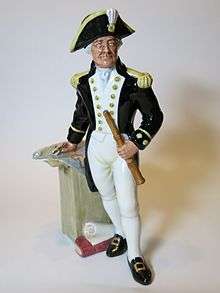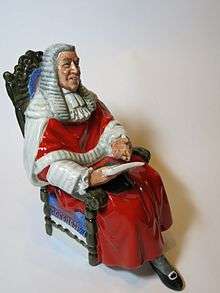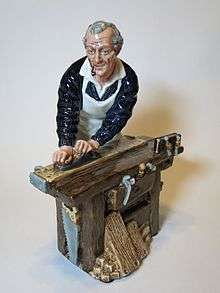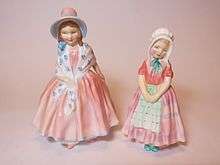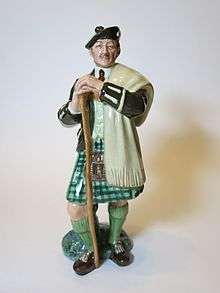Royal Doulton
 | |
| Industry | Ceramic Manufacturing |
|---|---|
| Predecessor | Jones, Watts & Doulton (1815), Doulton & Watts (1820), Doulton & Co. (1853) |
| Successor | WWRD Holdings Ltd. |
| Founded | 1815 |
| Founder | John Doulton, Martha Jones & John Watts |
| Headquarters | Stoke-on-Trent, England |
Key people | Henry Doulton |
| Owner | WWRD Group Holdings |
| Parent | Fiskars Corporation |
| Website |
www |
Royal Doulton was an English company producing tableware and collectables, dating from 1815. Operating originally in London, its reputation grew in The Potteries, where it was a latecomer compared to Royal Crown Derby, Royal Worcester, Wedgwood, Spode and Mintons. Its products include dinnerware, giftware, cookware, porcelain, glassware, collectables, jewellery, linens, curtains and lighting.
Three of its brands were Royal Doulton, Royal Albert and Mintons. These brands are now owned by WWRD Holdings Ltd (Waterford Crystal, Wedgwood, Royal Doulton), based in Barlaston near Stoke-on-Trent. On 2 July 2015 the acquisition of WWRD by Fiskars Corporation was completed.
History
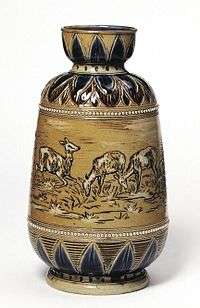
The Royal Doulton company began as a partnership between John Doulton, Martha Jones, and John Watts, with a factory at Vauxhall Walk, Lambeth, London trading as Jones, Watts & Doulton in 1815. After Martha Jones left the partnership in 1820, the trade name was changed to Doulton & Watts. The business specialised in making stoneware articles, including decorative bottles and salt glaze sewer pipes. The company took the name Doulton & Co. in 1853 after the retirement of John Watts.[1]
By 1871, Henry Doulton, John's son, launched a studio at the Lambeth pottery, and offered work to designers and artists from the nearby Lambeth School of Art. The first to be engaged was George Tinworth followed by artists such as the Barlow family (Florence, Hannah, and Arthur), Frank Butler, Mark Marshall and Eliza Simmance. In 1882, Doulton purchased the small factory of Pinder, Bourne & Co, at Nile Street in Burslem, Staffordshire, which placed Doulton in the region known as The Potteries.

When the Anglican St. Alban's Church was built in Copenhagen, Denmark, in 1887 with Alexandra, Princess of Wales as one of the driving forces, Doulton donated and manufactured an altarpiece, a pulpit and a font. They were executed in terra cotta with glazed details to the design of Tinworth.[2]
By this time Doulton was popular for stoneware and ceramics, under the artistic direction of John Slater, who worked with figurines, vases, character jugs, and decorative pieces designed by the prolific Leslie Harradine. Doulton products came to the attention of the Royal family. In 1901 King Edward VII sold the Burslem factory the Royal Warrant, allowing the business to adopt new markings and a new name, Royal Doulton. The company added products during the first half of the 20th century while manufacturing fashionable and high-quality bone china.
The headquarters building and factory of the Royal Doulton ceramics firm were in Lambeth, on the south bank of the Thames. This Art Deco building was designed by T.P.Bennett. In 1939 Gilbert Bayes created the friezes that showed the history of pottery through the ages. The Lambeth factory closed in 1956 due to clean air regulations preventing urban production of salt glaze. Following closure, work was transferred to The Potteries. The factory building was demolished in 1978 and the friezes transferred to the Victoria & Albert Museum. The office building in Black Prince Road survives, complete with a frieze of potters and Sir Henry Doulton over the original main entrance, executed by Tinworth.[3]

In 1971, S. Pearson & Son Ltd, a subsidiary of the Pearson industrial conglomerate acquired Doulton & Co. Pearson & Son owned Allied English Potteries and merged operations into Doulton & Co. All brands from Allied English Potteries and Doulton & Co. Ltd. including Royal Doulton, Minton, Beswick, Dunn Bennett, Booths, Colclough, Royal Albert, Royal Crown Derby, Paragon, Ridgway, Queen Anne, Royal Adderley and Royal Adderley Floral were moved under the umbrella of Royal Doulton Tableware LTD. Royal Doulton Tableware Ltd was a subsidiary of Doulton & Co. Ltd, itself a subsidiary of the Pearson Group Doulton & Co. became Royal Doulton plc in 1993. Waterford Wedgwood completed a takeover of Royal Doulton in 2005, acquiring all assets and brands.[1]
On 30 September 2005, the Nile Street factory closed. Royal Doulton Ltd., along with other Waterford Wedgwood companies, went into administration on 5 January 2009. Royal Doulton is now part of WWRD Holdings Ltd. Some items are now made in the parent company, WWRD Holdings Ltd in Barlaston, south of the Potteries Conurbation. Further production is carried out in Indonesia[4] On 11 May 2015, in a deal expected to close July 2015, the Fiskars Corporation, a Finnish maker of home products, agreed to buy 100% of the holdings of WWRD.[5] On 2 July 2015 the acquisition of WWRD by Fiskars Corporation was completed including brands Waterford, Wedgwood, Royal Doulton, Royal Albert and Rogaška. The acquisition was approved by the US antitrust authorities.[6]
Cultural references
- In the comedy television series Keeping Up Appearances her Royal Doulton china was frequently mentioned with great pride by the main character Hyacinth Bucket.[7]
Notable designers
Gallery
|
See also
Notes and references
- 1 2 "Royal Doulton". Pottery Histories. Retrieved 24 March 2015.
- ↑ "About the Church". St. Alben's Church. Retrieved 26 February 2010.
- ↑ TQ3078 : Doulton building at Black Prince Road near Lambeth High Street
- ↑ "Royal Doulton". indonesiamatters.com. 2012. Retrieved 17 January 2012.
- ↑ Bray, Chad. "Fiskars Agrees to Buy Owner of Waterford and Wedgwood". New York Times. Retrieved 11 May 2015.
- ↑ "Fiskars Corporation has completed the acquisition of WWRD and extended its portfolio with iconic luxury home and lifestyle brands". NASDQ Global News Wire. Retrieved 6 July 2015.
- ↑ IMDB
External links
![]() Media related to Royal Doulton at Wikimedia Commons
Media related to Royal Doulton at Wikimedia Commons
- Official Royal Doulton website
- Collecting Doulton, The independent magazine for collectors of Royal Doulton
- Examples in the collection of the Museum of New Zealand Te Papa Tongarewa
